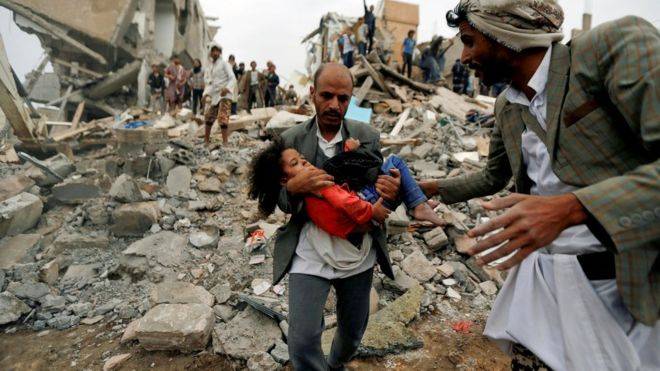Saudi Arabia appears to be intent on stirring up regional tensions in recent days, launching internal purges while pointing at its regional rivals and accusing them of waging war on the kingdom.
Saudi venting took a drastically sharp turn beyond its typical saber-rattling on Monday as it accused Lebanon of declaring war on it because of alleged “aggression” against the kingdom by Lebanese resistance group Hezbollah, a close ideological cohort and ally of Iran.
Saudi Gulf affairs minister Thamer al-Sabhan, in an interview with Al-Arabiya TV, said the Lebanese government would “be dealt with as a government declaring war on Saudi Arabia.”
Sabhan said this message had been delivered to the Saudi-allied Lebanese politician Saad al-Hariri, who declared his resignation as the country’s prime minister on Saturday in a broadcast from Saudi Arabia.
Hezbollah acts of “aggression” on the kingdom “were considered acts of a declaration of war against Saudi Arabia by Lebanon and by the Lebanese Party of the Devil”, he added.
Sabhan has been especially outspoken toward Hezbollah, whose Arabic name, translated to English, is “Party of God.” In recent weeks the Saudi minister has described the popular Shia movement as a “terrorist militia” that is “more dangerous than (Islamic State group) and al-Qaida put together.”
The heated rhetoric came as Lebanese Prime Minister Saad al-Hariri met with Saudi King Salman on Monday in Riyadh, a move meant to dispel rumors that he was detained amid an unprecedented anti-corruption purge. The purge, orchestrated by Saudi crown prince and heir apparent Mohammed bin Salman, led to the arrest of royals, ministers and investors including some of the kingdom’s most prominent businessmen and security figures.
Hezbollah has accused the Wahhabi kingdom of coercing Hariri into reading a Saudi-drafted statement under extreme duress. The resignation of the prime minister, a Sunni Muslim and longtime ally of Riyadh who enjoys Saudi-Lebanese dual citizenship, toppled a coalition government that included Hezbollah.
“The resignation was a Saudi decision dictated to prime minister Saad al-Hariri and forced on him,” Nasrallah said in a televised broadcast, adding that there was no domestic reason for Hariri’s decision.
Saudi Oger, the construction firm owned by the Hariri family, has faced a multibillion-dollar debt restructuring in recent years. The company was hit by a decline in oil prices led to sharp state spending cuts in the kingdom.
“Hariri’s political capital inside the Lebanese Sunni community had already taken a serious hit — partly because he was perceived as unable to stand up to Hizbollah and Aoun,” Randa Slim of the Middle East Institute think tank in Washington told The National. “For many Sunnis, the clumsy way with which the resignation was delivered and its timing are raising a lot of suspicion as to the real motive.”
The Saudi declaration accusing Lebanon of aggression was paired with a similar statement by the kingdom’s foreign ministry accusing Iran of “hostile actions” stemming from the alleged Iranian-supplied rocket launched at Riyadh by Yemen’s Houthi movement, who the Saudis accused of being Iranian proxies.

On Saturday, Houthi popular committees launched a Burkan H2 ballistic missile at King Khalid International Airport. Despite Saudi claims that it successfully intercepted the missile, regional newspapers reported explosions near the airport and a number of delayed flights resulting from the attack.
“Iran’s role and its direct command of its Houthi proxy in this matter constitutes a clear act of aggression that targets neighboring countries, and threatens peace and security in the region and globally,” the Saudi-led military coalition waging war on Yemen said in a statement on Monday. The attack could be considered “an act of war against the kingdom of Saudi Arabia,” it said.
The coalition fighting has vowed to tighten its blockade on the war-ravaged nation, saying it would close all air, land and sea ports to stem the alleged flow of arms from Iran. The move is likely to worsen a humanitarian crisis that according to the United Nations has pushed some seven million Yemenis to the brink of famine and left nearly 900,000 infected with cholera.
Iran rejected the criticism as “destructive and provocative.” It has rejected the possibility that it could transfer missiles to Yemen, claiming such capabilities don’t exist. Yemen’s Houthi-aligned security forces and popular committees have claimed that the Burkan H2 is an indigenous weapon.
Iranian Foreign Minister Javad Zarif was absolutely blistering in his response to the Saudis delivered via Twitter on Monday.
“Visits to the belligerent (Saudi kingdom) have proved hazardous to regional health,” Zarif said. “Trump visit led to Bahrain repression followed by Qatar debacle.”
“Visits by (Trump son-in-law Jared) Kushner & Lebanese PM led to Hariri’s bizarre resignation while abroad. Of course, Iran is accused of interference,” he continued.
The Saudi kingdom “bombs Yemen to smithereens, killing thousands of innocents including babies, spreads cholera and famine, but of course blames Iran,” Zarif continued.
The kingdom “is engaged in wars of aggression, regional bullying, destabilizing behavior and risky provocations. It blames Iran for the consequences.”
Via TeleSUR






